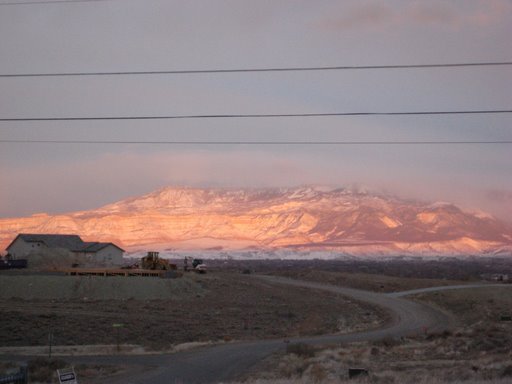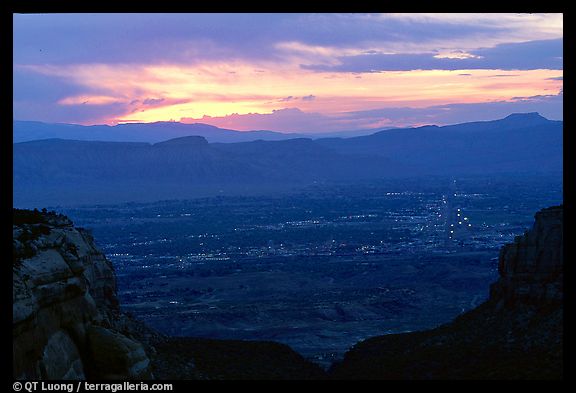Thursday, September 27, 2012
Colorado Leaders Aim to Lead Nation in Clean Energy
GRAND JUNCTION, Colo.- One of the issues talked about at the Club 20 debates hits close to home for Coloradans and that's energy. Natural gas, wind, solar and coal are just a few.
The way people get from point A to B is changing, and many hope it will continue to change for the better.
Sen. Michael Bennet, D-Colo., said, “I don’t want my daughters to have to buy their oil from the Persian Gulf. That doesn’t make any sense for them to have to do that. We ought to fix this problem.”
Those behind the vehicles that are not well known for being environmentally friendly are fighting back against the stereotypes.
Paul Witt, a spokesperson for Ford Motor Company, said, “You need a truck with a lot of capacity and that can haul, but on the other hand, you still want a truck that is going to be burning cleaner and burning cheaper. This is a great option for you."
With just a flip of a switch a person can go from using gasoline to compressed natural gas, known as CNG.
“You can switch it while you’re driving. It doesn’t affect the operation, the engine at all,” Witt said.
In 2011, CNG filling stations were opened in Rifle and Grand Junction.
“CNG burns cleaner, it reduces emissions, it’s got about the same power per unit volume as gasoline does, and it’s cheaper," said Witt.
There are also plans for more filling stations.
David Ludlam, the executive director for the West Slope Colorado Oil and Gas Association, said, “There’s a collaborative effort in the Roaring Fork Valley and there’s also a collaborative effort in Grand Junction to add additional stations. We are trying to get one in every municipality on the I-70 corridor.”
“We have incredible entrepreneurial horsepower in this state that’s thinking about how we create a 21st century energy equation for our people. I think our state could be the leader of 50 states.”
The West Slope Colorado Oil and Gas Association says that teamwork with political leaders is a huge asset as they move forward.
“Thanks to Senator Bennet and Governor Hickenlooper’s great leadership, they’ve helped take what we’ve achieved locally and help bring a national voice, the need for national infrastructure," said Ludlam.
Parties involved with the CNG movement are ready to see it expand, and they say Colorado should lead the way.
Wednesday, September 19, 2012
Solar Friendly Communities in Colorado
Solar Friendly Communities, a coalition of Denver, Fort Collins, Golden, Boulder County, the Colorado Solar Energy Industries Association (COSEIA) and Rocky Mountain Institute (RMI) have joined to help bring down the cost of installing solar in Colorado by streamlining permitting and inspection.
The project is supported by a SunShot Initiative grant as one of the 22 national Rooftop Solar Challenge teams. The nearly $500,000 grant is aimed at reducing permitting and interconnection costs by 25 percent through online tools, hands-on support and quantifiable progress assessments, according to the Department of Energy.
The problem is local permitting and inspection processes add about $2,500 to the cost of each residential system, according to some recent reports. In addition, the permitting requirements vary dramatically across states like Colorado. For instance, the coalition said Colorado has more than 200 municipalities, 64 counties and 65 utilities, each with their own permitting and inspection processes.
The workshops, being held in Centennial, on Sept. 18; Denver, on Sept. 19 and Boulder on Sept. 20, mark the introduction of the coalition’s “12 Best Practices: A Roadmap to a Solar Friendly Community”. “The workshops are primarily intended for municipal and county officials as many of the best practices we recommend involved local permitting, inspection and policy issues,” said Rebecca Cantwell, senior program director for Solar Friendly Communities. “But the workshops are open to all and we expect more than 60 attendees including community members, business leaders, solar installers and municipal leaders.”
The coalition launched in February, 2012 and this represents a step forward in its goals to lower costs. “We have been working with our core partner communities of Denver, Boulder County, Fort Collins and Golden since February and held in-depth workshops with each community in May and June to review their current practices and explore opportunities for streamlining,” Cantwell said. Chief building and key permitting officials from each jurisdiction participated. “We have been working with them individually on a variety of topics identified in the workshops since then,” she said.
Since the initial meetings, the campaign has been doing outreach in the communities. “We have been working with a solar industry group and other stakeholders to understand what steps would be most helpful in helping them overcome barriers to solar deployment,” Cantwell said. The outreach and earlier meetings, as well as discussions with representatives of local governments, industry, and other stakeholders allowed them to create the roadmap. “Dozens of stakeholders were involved in many different conversations. The product of these months of work will be explained and presented at the workshops,” she said.
Sunday, September 2, 2012
Solar gardens to bloom on Colorado rooftop, farm field and parking lot
Where do you plant a solar [3] garden? In Colorado [4] they’ll be found on the roof of an old airplane hangar, on pillars hovering over a vegetable field and a school parking lot.
Those are a few of the places that the first solar gardens – photovoltaic arrays that residents will able to buy shares in – are set to be built under a new program [5].
Xcel Energy, the state’s largest electricity utility, Tuesday announced that it had awarded contracts for its first 10 solar gardens – totaling 4.5 megawatts.
“This is very exciting for the solar industry,” said Blake Jones, chief executive officer of Namaste Solar, a Boulder-based installer participating on two of the projects.
Only about a quarter of the nation’s rooftops are big enough and sunny enough for rooftop solar, according to the National Renewable Energy Laboratory in Golden and not everyone can afford a rooftop array that can cost $12,000 to $180,00 in Colorado.
Solar gardens enable people who don’t have a sunny roof or the money to buy a full array to buy or lease a piece of an array — in some cases for as little as $1,000.
The Colorado Community Solar Garden Act was passed in 2010 to promote the community solar installations and directed the state Public Utilities Commission to include gardens in renewable energy plans. Xcel’s new incentive program for 18 megawatts of gardens in the next two years came out of that effort.
Xcel opened it program on August 15th and within 30 minutes had three times as many applications [6] as it could fill.
Operators will get paid on a sliding scale — 14 cents to 10 cents — for each kilowatt-hour the garden produces. Residents will get a credit on their bill of about 6.8 cents a kilowatt-hour.
The Carbondale-based Clean Energy Collective, a private developer specializing in solar gardens, will develop six projects.
Among them are two gardens in Denver, where space is at a premium. One 400-kiolwatt array will cover the curved roof of the Lowry Hangar 2 and another 500-kilowatt installation will form a parking lot awning at the Evie Dennis school campus.
At the Golden Hoof Sustainable Demonstration Farm, in East Boulder, the collective will build a 500-kilowatt solar garden on pillars over a farm field.
“We’ve looked for innovative solutions for each community,” said Paul Spencer, chief executive officer of Clean Energy Collective.
The collective’s other solar gardens include one 108-kilowatt project in Arvada and two 500-kilowatt units in Breckenridge.
Solar Panel Hosting, Namaste Solar and Solar Power Financial teamed-up to win 497-kilowatt projects in Aurora and Saugache County.
“Installation will be similar to any other array,” Namaste’s Jones said. “The more complex aspect will be dealing with subscribers.”
Community Energy Solar, a Boulder-based project developer, and Bella Energy, another Boulder-based commercial solar installer are developing two 500-kilowatt projects in the City of Lafayette.
The projects will be on municipal land, one is adjacent to Lafayette’s water treatment plant and the city will be the prime customer for the garden, said Community Energy’s Eric Blank.
Lafayette officials and Community Energy executives are planning to donate output to low-income families, who would become subscribers to the garden for free.
“These ten projects are in areas that serve a million people, so the gardens will only be able to take a fraction of a percent of the potential customers,” said the Clean Energy Collective’s Spencer.
Information about the projects can be found at Xcel’s solar garden site [7].
Subscribe to:
Comments (Atom)




